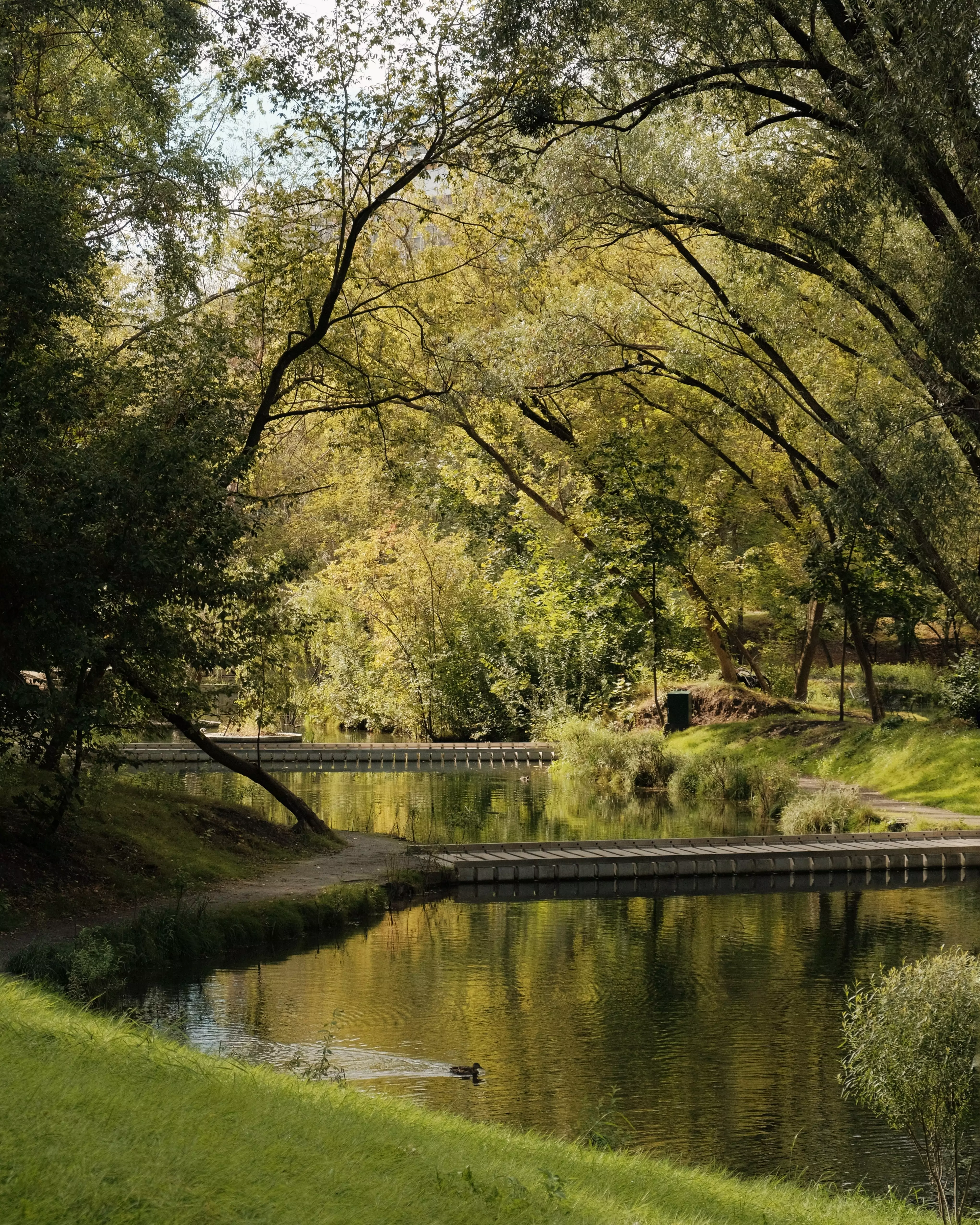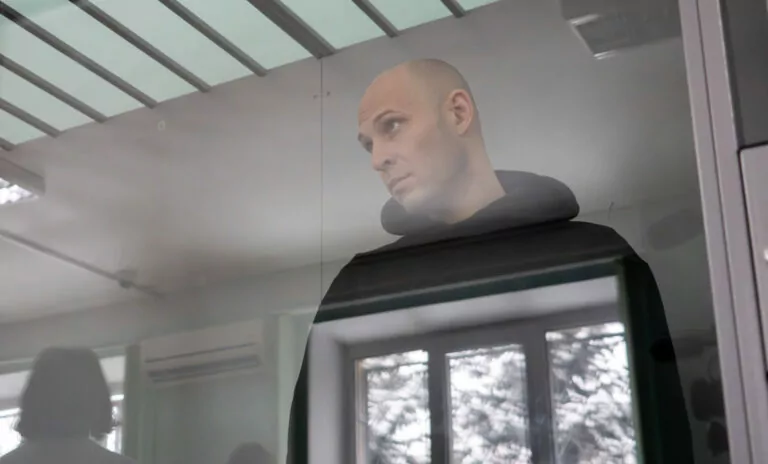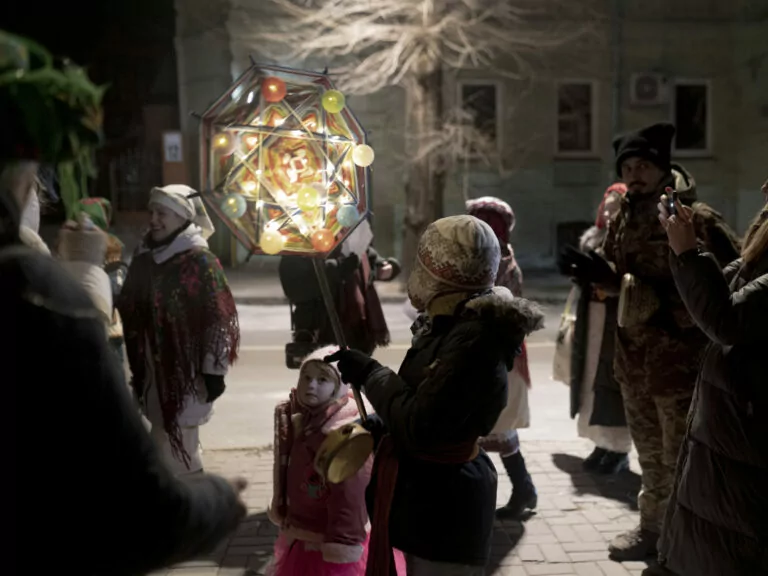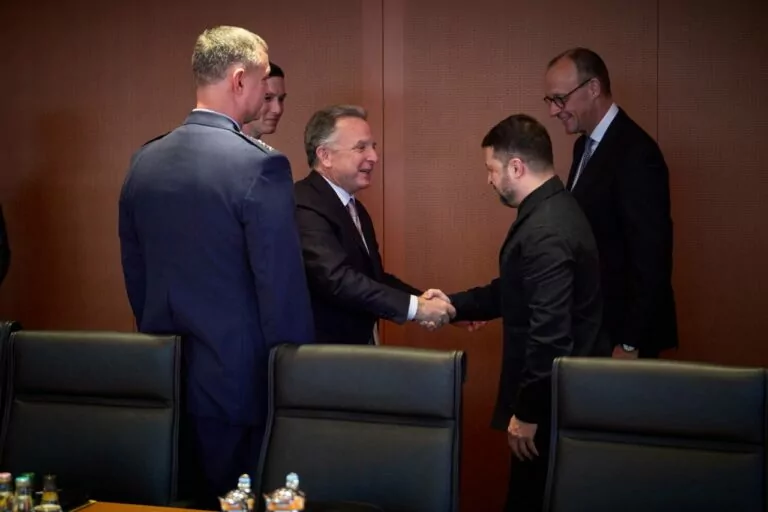The Russian military attacks Ukrainians right in their homes, hitting the residential buildings and critical infrastructure. Meanwhile, there are foreign countries where citizens can go on with their lives, staying safe and warm. And nevertheless, some people leave the comfort of their houses to come to Ukraine.
Here is the second of the stories of three volunteers who came to Kharkiv, the city severely affected by the Russian attacks, to work at the “Hell’s Kitchen” – an organization cooking meals and baking bread for the military and medical staff in Kharkiv Oblast.
Sylvia [she asked us not to mention her full name – ed.] lived in Vienna working in tourism when COVID-19 hit the world and changed everything we knew. Sylvia`s job was especially affected by the pandemic.
Things have not quite gotten back to normal when another shock came. The Russian full-scale invasion felt close to Sylvia as her Israeli friend of Ukrainian origin had introduced her to Ukraine’s political issues and culture a few years ago. So she has been taking everything happening since Feb. 24 a bit more personal.
At the beginning of August Sylvia came to Ukraine. Her motivation was clear and simple, she wanted to help the people. She chose Kharkiv because the city stunned her with the news reports about daily shelling since the very first moment of the full-scale invasion.
Sylvia noted that it was not easy to organize the trip from outside, there was no information about volunteering online. So she just hopped on the train, came to Lviv, and then decided to go to Kharkiv.
Now Sylvia volunteers in the Hell`s Kitchen helping to make bread. “It’s a pretty big operation, and good-organized, and I like it there,” she says.
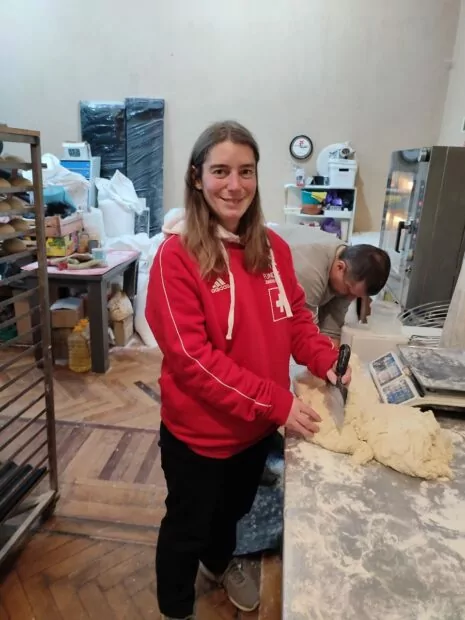
That`s [baking the bread – ed.] one of the things I do. But when I get the opportunity to do some other things, like delivery to the newly-liberated territories, that’s something I do too. Now there will be an evacuation mission to Kherson coming up.
“We need to show that we care.” Read Edward`s story, a Canadian who came to help Kharkiv
What is your background, what have you heard about Ukraine and Kharkiv before?
I didn’t know anything about Kharkiv. It was kind of the first city I saw in the night getting the bombs, the live streams were running. Since that day it was like nearly every night they hit again and again, and it was always in my mind.
But I started to be interested in what was happening in Ukraine around one year before the full-scale war started. I have a friend from Ukraine, he isn’t living here anymore, but he has a family here, and he started talking about things that were happening, and I started to be interested to look into it and try to understand more about what was going on.
Because it’s not like something you really hear in Europe so much, you know, in normal media. It’s like the last two years the only thing in it was really “Corona”, there`s nothing new.
Was it politics and the news reports that you studied, or have you heard anything about Ukrainian culture, or our traditions?
Well, I knew a little bit, but not so much. It’s not so easy to do that [get information – ed.] from afar, really. But if you are in the country and speak to people and see how they are – yes, that’s a lot easier to understand what’s happening.
Sylvia says she has been to quite a few countries before and she knows people can be very different in different places. “Even from Austria to France, the way people are basically is very different.” So she did not want to judge and make any presumptions from a distance.
And what do you think about Ukrainians and Kharkiv citizens now?
I like them very much. They are positive and strong people not willing to give up, you know. They continue going on, that’s really good.
Did you experience any difficulties coming to a foreign country with a different language and mindset?
I started to learn a little bit of Russian when I started to get interested in Ukraine. So I understood a little bit when I came here, but just basically, not fluent. Now I can have little conversations, at least. So no, language wasn’t really a problem, but I was surprised that in Lviv few people were speaking English. That’s a lot better here in Kharkiv.
You`ve started learning Russian, not Ukrainian, right?
Well, I mean it was nearly two years ago. Or one and a half years. It was before the invasion started, and everything, so I didn’t really put so much weight on which language I learned. And it was much easier to find Russian courses than Ukrainian courses. Russian language courses were no problem, Ukrainian language courses not so easy [to find – ed.].
Sylvia notes that now the situation has changed. “Now I’m starting to get a little Ukrainian too!” she smiles.
Was there anything that surprised you in Kharkiv?
Yeah, I mean, it’s a small thing, but I was really surprised at how immaculate the parks were being kept, with all the flowers and everything. Even though there is a war going on, it was just so normal and beautiful. This was strange, I didn’t expect that, really.
And then, when I did deliveries to Saltivka [one of the Kharkiv districts most affected by Russian shelling – ed.]. The big buildings have no water, no electricity, the windows are blown out and everything. And there are still a few people living there! They are cooking outside and sitting outside. But they have their little gardens with flowers and everything kept in order too. That’s really kinda a little bit of normalcy still kept going.
What was the scariest or most challenging moment in your experience in Kharkiv?
I am not scared, I knew what was happening before I came here, so it wasn’t surprising or something.
The blackouts are challenging. But it’s a managing thing, so if you are prepared it isn’t that difficult until now, because it’s never long enough to really cause problems. It’s not cold enough to be really uncomfortable now. But it’s an organizational thing more or less because then it gets difficult to work. We can’t bake the bread, because we need electricity. And the kneading machine doesn’t work, so it’s a lot more work to make the dough, because we have some small gas ovens, but we can make less of the bread then. So until now, it’s more organizational.
What’s really bad is in the liberated territories when you are outside in most places there is no cell reception, no internet, nothing. If your car breaks down you can’t call anyone for help or whatever. But people are always friendly and there is always somebody who stops and helps.
“So it’s not really a big problem,” adds Sylvia. She smiles talking about the people she meets in Kharkiv Oblast. “That’s all the small things you never think about when you don’t have problems normally,” she concludes.
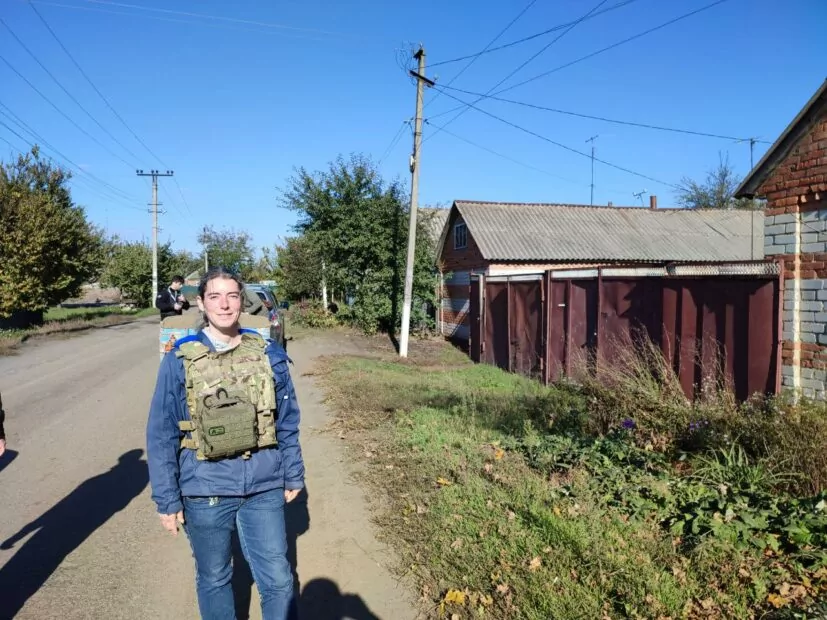
Sylvia lives in a hostel in Kharkiv, and neither her place nor the Hell`s Kitchen center is equipped with generators. “So when the electricity is out it’s out.” Despite this, Sylvia plans to stay in Kharkiv for winter.
She managed to make Ukrainian and foreign friends in Kharkiv and explore the city. In summer Sylvia’s friends took her around. Her favorite place has become “one of the parks, I don`t know its name now, but there is a water source in it, and you can go bathing, there is an outdoor fitness studio, and for the children, there’s a lot of playground and everything.”
Sylvia is describing Sarzhyn Yar, a popular recreation zone in the city, to which Kharkiv citizens often refer as “The Source”. We are joking that she has become local, using Kharkiv slang names for the places.
What was the best moment in your experience in Kharkiv?
The best moments are when you are out, helping people and you see that they are glad for your help. You see that you can really change a little bit of something, at least.
You never make a big impact, but at least you make some impact.
Is there anything you think the world gets wrong about Kharkiv and Ukraine?
Yeah, there are a lot of things you can practically only understand if you are at the place and with the people and speak to the people. But I couldn’t pinpoint exactly one thing to say or something like that now. Because I’m somebody who doesn’t like to build any image before I go somewhere, because I know it’s necessarily false, whatever I’d try to imagine, it would be different.
What do your friends and family say about your decision to go to Kharkiv, how do they react?
Well, the most important comment is “You are crazy for doing this!” I don`t know, it’s difficult for them to understand. But I’m getting positive feedback too. It’s mostly from people who are a little away from me.
The people who are near me are mostly afraid that something will happen, so it’s like “You are crazy!” But talking to the people who are a little bit out of outline, from the church, or with other people, I just have not so intense contact, there I get a lot of “Oh that’s good you are doing this, thank you for helping”, and whatever. I think it’s more an emotional thing, when people are more afraid that something is gonna happen, that’s why they are negative, but when they understand they react positively.
What would you say to the world about Ukraine and Kharkiv?
Kharkiv is a very cultural city. It’s a very artistic city, there are a lot of people making music and art. It`s a very friendly city and an old city. It’s the cultural center of Ukraine more or less, no? With all the universities and everything, yeah. I really hope – well, the Russians won`t stop on their own, – but the war will be won, and that everything will be back to normal sooner or later.
What would you say to the Kharkiv residents and all Ukrainians?
Thank you for just being how you are. I learn a lot here. I’m trying to help but they help me too a lot.
Tetiana Fram and Olena Myhashko
